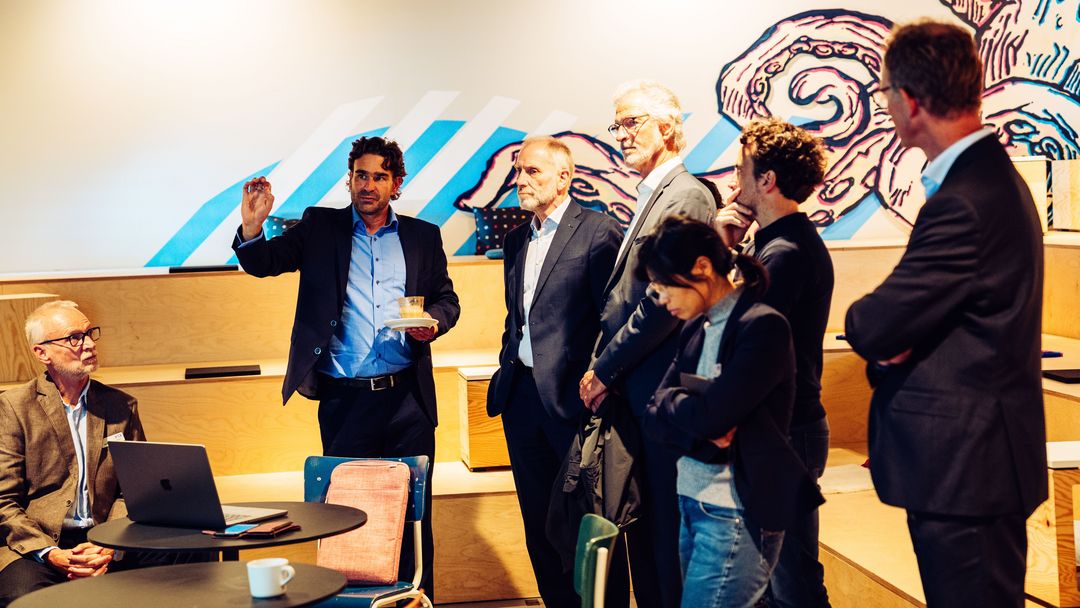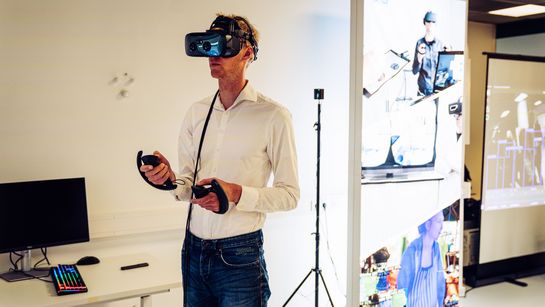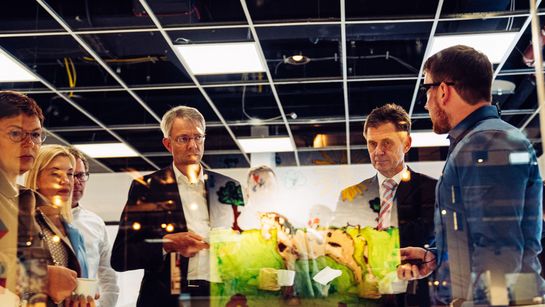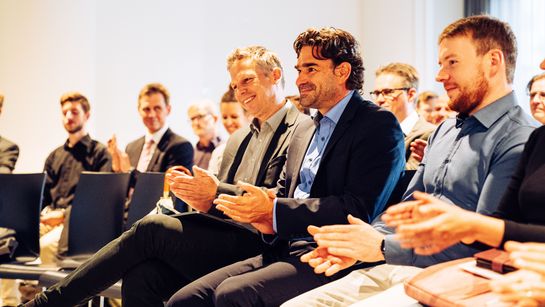The insightful, interactive event was hosted by the research teams at DFKI IML and the University. Both are led by Prof. Dr.-Ing. Daniel Sonntag, who holds an endowed professorship, that is sponsored by CEWE, EWE AG, BÜFA, the OLB foundation, Dr. Caroline Neumüller, Alexander Neumüller, the economic association DER KLEINE KREIS e.V. and the Foundation of the Metal Industry in the North West.
The event was opened with a keynote by Dr. Christian Friege, CEO of CEWE, emphasizing the importance of knowledge transfer and technological innovations in AI for the competitiveness and growth of regional industries and economy. Friege spoke about motivation of the regional industries and their commitment to sponsor the endowed professorship at the department of computing science at the Oldenburg University and their long-term vision to promote sustainable AI-based innovations for the benefit of regional economy together with DFKI.
Prof. Daniel Sonntag introduced to the audience in detail the various research topics of AAI, the Interactive Machine Learning department, and their relevance to the federally funded projects by BMBF which are conceptualized and implemented in the respective groups. He also presented the research plans for 2023 and 2024 and mentioned the established academic co-operation with the group of Prof. Dr. Christian Meske, who is leading the group of socio-technical system design and artificial intelligence, at Ruhr University Bochum.
In particular, Prof. Sonntag spoke about the potential of IML’s and AAI’s research abilities and state-of-the-art machine learning and VR-infrastructures of the IML student laboratory (iml.dfki.de) and acknowledged the readiness of researchers in his department to address the complex AI-transfer aspects of regional industries, especially SMEs from Oldenburg region. He thanked and acknowledged the industry donors for their generous and far-sighted support which allowed for an increased access to high-end hardware infrastructure for researchers and students at AAI.
Prof. Dr. Oliver Zielinski, the director of the DFKI research department Marine Perception (MAP), spoke about the various competencies and the scope of artificial intelligence and industry-relevant projects in DFKI Niedersachsen. Prof. Zielinski addressed a broad range of application areas, how the research teams at MAP and the competence center AI for Environment and Sustainability, DFKI4planet, are engaged in collaborative and applied research for the benefit of a green and sustainable planet. He highlighted the need of governance aspect of AI-based technologies to enhance sustainable industrial initiatives at a local level and encouraged the industry leaders present at the event to promote the regional initiatives, especially with a focus of research-based collaboration.
Prof. Dr. Thiago Gouvea, senior researcher at IML, who is leading the IML’s project idea Seadash presented the vision and IML’s role in conducting applied research and scaling the AI-based applications for the benefit of biodiversity while using sound event data. He briefly mentioned why and how challenges of interactive machine learning can be addressed in terms of handling and training the large and heterogeneous data from environment, which is sourced by biodiversity projects.
Among other presenters, Prof. Dr.-Ing Marc Herrlich together with IML researcher Aliki Anagnostopoulou gave a brief introduction to research topics in HCI group and NLP topics. IML researcher Bengt Lüers introduced the group of master students mentored by him in the UOl’s project group CourseVR. They presented their methodologies and scientific work during their master’s project, and showed the videos of the results acquired through digital pen experiments.
After the speeches, short pitches and presentations, the invited guests, researchers, and industry leaders were invited to see, test, and interact with live demos that are exhibited at CORE IML. CORE IML will be opened next year as DFKI’s unique work-and-interact space in the heart of Oldenburg down-town, which provides an open space for industry stakeholders, SMEs, citizens, and other researchers to hold scientific dialogue and witness IML’s and AAI research firsthand.

First Industry symposium as a milestone towards CORE IML
| Health & Medicine | Environment & Energy | Human-Machine Interaction | Virtual & Augmented Reality | Interactive Machine Learning | Saarbrücken | Osnabrück / Oldenburg



